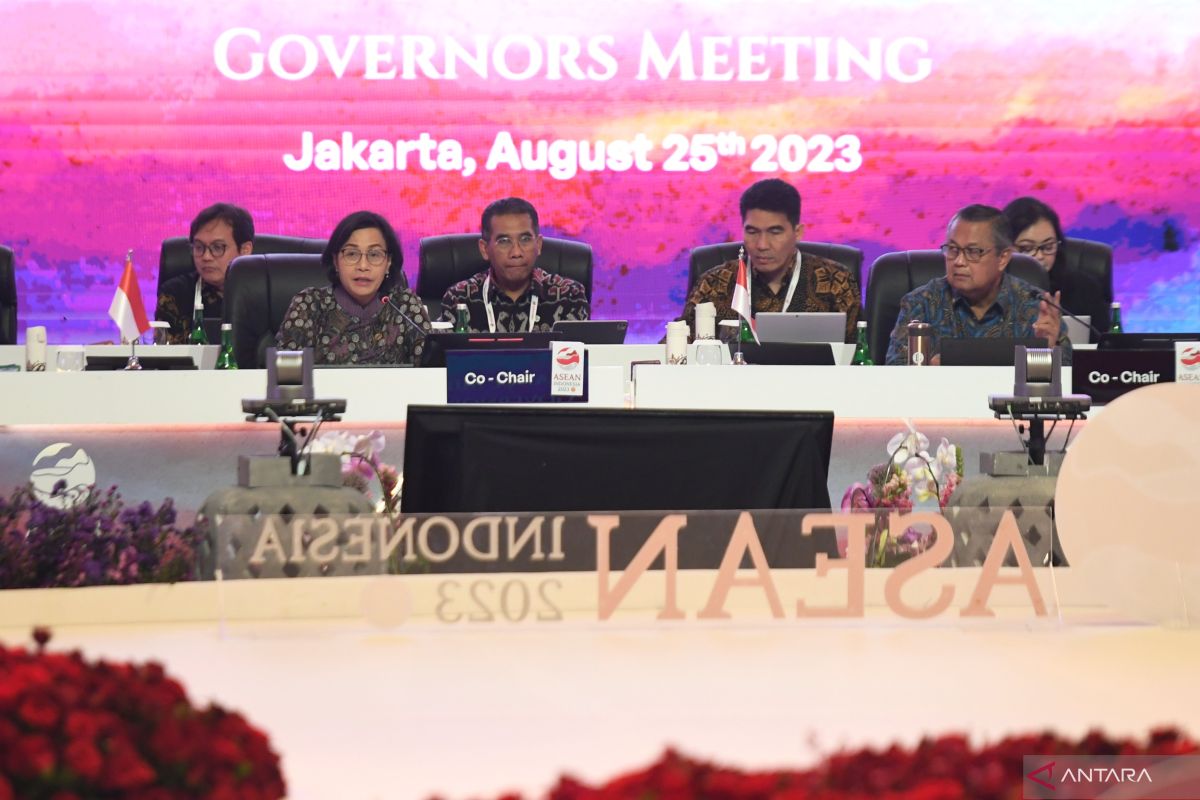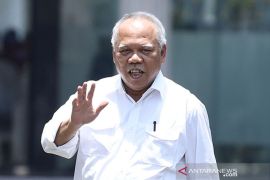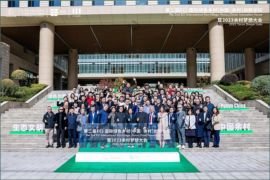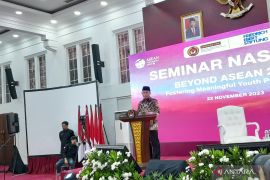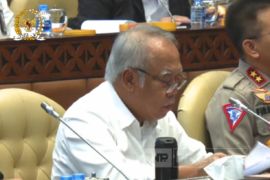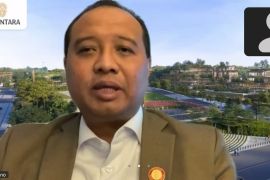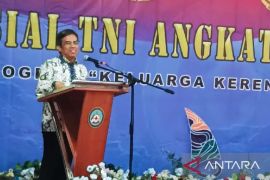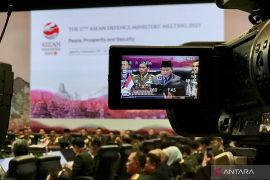The meeting was attended by finance ministers and central bank governors from nine ASEAN countries: Brunei Darussalam, Cambodia, Indonesia, Lao People's Democratic Republic, Malaysia, the Philippines, Singapore, Thailand, and Vietnam.
Moreover, in accordance with the ASEAN Leaders' Statement on the Application of Timor-Leste for ASEAN Membership in November 2022, the ASEAN also invited Timor-Leste to participate as an observer in the series of meetings.
The series of AFMGM meetings were also attended by representatives from six international organizations as well as strategic partners, such as Australia and the European Union (EU).
During the meeting, Indonesia encouraged the resilience of ASEAN countries in facing global pressures.
"The focus is on how ASEAN can promote resilience," Indonesian Minister of Finance Sri Mulyani noted at a press conference after a series of AFMGM events here on Friday (Aug 25).
To realize this resilience, Sri Mulyani highlighted several priorities on structural policies, interconnectivity, infrastructure financing, and transition.
She also explained that AFMGM emphasized the importance of strengthening the macroeconomic policy mix in the region, so that member countries could utilize all available tools to ensure economic stability.
During the series of AFMGM events, several agreements were reached, including signing of the cooperation agreement to strengthen the use of local currencies in cross-border transactions or called Local Currency Transactions (LCT) between Bank Indonesia (BI), Bank Negara Malaysia, and the Bank of Thailand.
The meeting also agreed on infrastructure financing and transition financing. In this regard, the finance ministers discussed the alignment of infrastructure financing, with a taxonomy for sustainable finance.
One of the efforts to realize this is to strengthen financing by repositioning the ASEAN Infrastructure Fund to become the ASEAN Green Fund.
This was done to promote sustainable development for every infrastructure in regional countries.
In the meantime, transition financing aims to support the achievement of a low-carbon economy in the ASEAN.
Joint Ministerial Statements
Apart from producing several agreements, the 10th AFMGM also produced Joint Ministerial Statements (JMS) covering the priorities of the 2023 ASEAN Indonesia Chair, economic developments and policy challenges, health and financial collaboration, food security, and financial integration, and liberalization.
The Joint Statements also include trade and investment facilitation, financing connectivity, payments and services, infrastructure financing, sustainable finance, financial inclusion, disaster risk financing, as well as strengthening ASEAN financial processes and new initiatives.
On the priorities of the 2023 ASEAN Indonesia Chair, the AFMGM emphasizes four main themes: financial and health cooperation; food security; local currency transactions; and regional payment connectivity.
Meanwhile, related to economic developments and policy challenges, the meeting noted that the ASEAN remains a bright spot amid sluggish global economic growth.
In terms of collaboration in the areas of health and finance, the AFMGM recognizes the importance of collaboration between finance and health authorities to strengthen regional health capacity and welcomes the Joint Ministers of Finance and Health Meeting that was held on August 24, 2023.
The meeting noted the study on national and regional financial architecture for strengthening post-COVID-19 pandemic prevention, preparedness, and response (PPR) in Southeast Asia.
In terms of food security, the AFMGM recognizes the importance of financial sector support to ensure regional and global food security.
Meanwhile, with regard to financial integration and liberalization, the meeting commended the efforts of the Working Committee on Financial Services Liberalization (WC-FSL) on the notable progress in ongoing and new financial services liberalization initiatives.
Regarding trade and investment facilitation, the meeting commended the Working Committee on Capital Account Liberalization (WC-CAL) for its continued efforts in strengthening policy dialogue and information exchange on capital flows' trends, statistics, and measures among ASEAN Member States.
The meeting welcomed the establishment of the ASEAN Local Currency Transactions Task Force (LCT-TF) and endorsed the High-Level Principles (HLP) on ASEAN
LCT Framework that will provide the key principles in implementing the ASEAN LCT Framework to guide collaboration among ASEAN Member States to enhance accessibility and efficiency in local currency transactions and promote its wider adoption by market participants in the region.
In terms of financing, payment, and service connectivity, the meeting was pleased with the expansion of the bilateral cross-border QR payment linkages, with the launch of Singapore-Malaysia QR payment linkage.
The meeting also looked forward to the upcoming QR payment linkage launches between Cambodia and Vietnam, Cambodia and Lao PDR, Vietnam and Lao PDR, the Philippines and Malaysia, Indonesia and Singapore, and Thailand and Lao PDR; as well as on cross-border remittance linkage launches between Thailand and Malaysia, Indonesia and Malaysia, as well as Singapore and Malaysia.
In the area of infrastructure financing, the meeting endorsed the result of High-Level Dialogue on Promoting Sustainable Infrastructure Development to strengthen ASEAN Member States' perspectives on financing gaps and infrastructure investment opportunities in the ASEAN; the need to increase private sector participation in infrastructure financing; and the importance of exploring more innovative sources of infrastructure financing.
Meanwhile, in the area of sustainable finance, the meeting noted the progress of the ASEAN Taxonomy Board's (ATB's) targeted consultation process on Version 2 of the ASEAN Taxonomy that commenced in June 2023.
In terms of financial inclusion, the meeting acknowledged the continued improvement of the average level of ASEAN financial exclusion, which is currently at 21.8 percent based on the ASEAN Member States' national data, surpassing the 2025 target of 30 percent in the Strategic Action Plans (SAP) for Financial Integration 2016-2025.
In the area of disaster risk financing, the meeting welcomed the progress made by the ASEAN Disaster Risk Financing and Insurance (ADRFI) Phase 2 to help policymakers quantify their financial exposure to natural disasters, assess the gap from existing contingency financing, adopt effective natural disaster risk financing, and plan for targeted capacity building to enhance financial resilience.
In the meantime, regarding the efforts to strengthen the ASEAN Finance Process and New Initiatives, the meeting agreed on the need to intensify coordination and dialogue among ASEAN members and acknowledged the potential benefits of having more frequent meetings during a chairmanship year.
The 10th AFMGM, as the second AFMGM held in 2023, was welcomed by the meeting and showed how Indonesia's arrangement demonstrates the benefits of having a second AFMGM in a year.
The meeting agreed that similar or enhanced arrangement in the future will be based on the incumbent Chair’s discretion on the need for additional meetings.
Related news: ASEAN agrees to harmonize infrastructure financing
Related news: AFMGM results will strengthen collaboration with Finance Ministry: BI
Editor: Rahmad Nasution
Copyright © ANTARA 2023
